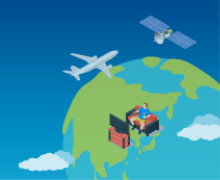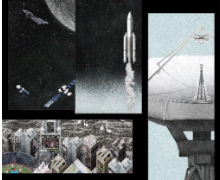- Sustainability
- Our Activity
- Future Stories Vol. 5 Contents
For the next generation and the community
Future Stories Vol. 5
Contents
Baseball Contents x Sustainability
“Future Stories” is a series in which we interview Group employees about initiatives that will lead to a future with Space for your Smile.
SKY PerfecTV! is proud of our track record of broadcasting the professional baseball for over 20 years. Since 2019, we have been able to broadcast and distribute all official games, and have always provided services that meet the needs of fans of the professional baseball.
On the other hand, there are currently concerns that the number of baseball players will decline in the future due to the declining birthrate. Therefore, we are working on activities to ensure a continued passion for sports. By actively covering not only the professional baseball but also amateur baseball for all levels from student leagues to adult leagues, we hope to deliver a “goal” to which baseball fans can aspire and thereby maintain their passion for baseball forever. We have also launched a new service which brings together a community of fans to mutually enjoy baseball broadcasts with retired players.
We spoke with two passionate members who are working hard to sow the seeds for the future of baseball.
―――Interviewee

From left: Sato, Matsumoto
- SKY Perfect JSAT Corporation
Media Business Unit Media Business Group
Content Business Division - Kei Matsumoto (Team manager)
- SKY Perfect JSAT Corporation
Media Business Unit Media Business Group
Content Business Division - Kazuki Sato
Work on amateur baseball programming in relation to sustainability
―――Would you please explain how your work is related to sustainability?
Sato: I am in charge of the baseball genre. In terms of sustainability, I believe that the raison d'être of professional sports is to contribute to the region through sports and entertainment, and to help sustainably develop the region. Sports organizations also share this belief, so I am confident that such contribution through sports is truly a form of sustainability.
Of course, for the Group, it’s important to sign up the next subscriber. For baseball teams, it’s important to sell the next ticket. Nevertheless, we must put effort into activities to ensure continued passion for sports which will lead to continually growth of the region.
As an initiative for the future of the baseball world, we are promoting amateur baseball at all levels from students to adults. As the number of children decreases due to the declining birthrate in Japan, we hope that featuring amateur baseball in our programming will give children a goal to pursue and increase the number of children who play the game. By providing children with opportunities to enjoy baseball and ensure that a passion for baseball continues, we ultimately hope to give back to professional sports. Based on my desire to work together with baseball teams and assist those teams, I have been conducting activities related to amateur baseball since last year.

Sports Live+ has been broadcasting games played by the Fukuoka SoftBank HAWKS’ first-string team since the service began in March 2020. Furthermore, acting upon our desire to expand the scope of baseball, we have sent out the message that we will cover a wide range of amateur baseball.
In fiscal 2022, we collaborated with the Fukuoka SoftBank HAWKS to implement three types of programming.
The first is the “Hawks Cup,” a hardball baseball tournament for junior high school students. This tournament is held to determine the number one club team from nine prefectures in the Kyushu, Okinawa, and Yamaguchi regions. Last year, games starting from the quarterfinals were broadcast live and distributed for free.
The second programming is “Hawks Junior” which is aimed at elementary school students. This broadcast starts from the first meeting held to select players. The final sixteen Hawks junior players to be selected will compete in a tournament called the NPB Junior Tournament at the end of the year. We created a documentary program that closely follows the selected team for a six-month period starting from August.
The third programming is the “Queens Tournament.” Teams participate from the categories of female high school students, university students, and working adults, and a final tournament of eight teams is held. We distributed a broadcast of the final game of the tournament.
Girls play on youth baseball teams with boys until elementary school. However, there are no baseball teams for girls once they reach junior high school, so girls switch to softball. Even so, there are many girls who want to continue playing baseball. I believe that it would be better to have an environment that allows girls to continue playing the game they love.
It’s a little unfair to decide that “girls play softball and boys play baseball.” Although the Group can’t do much to change that way of thinking, I believe that we can encourage girls to play baseball by giving them goals to pursue. Specifically, we can let them know about the Queens Tournament, that there are teams to play on even for high school girls, and that a strong team named “All Queens” plays in the tournament. Our programming informs viewers of such things, so it is truly connected to sustainability and SDGs.
All broadcasts and distribution are free of charge. I hope that this programming will become widely known around the world, and that it will give people goals to which they can aspire. We are working on these initiatives together with the Fukuoka SoftBank Hawks, and they have told us that they are glad to have partnered with SKY PerfecTV!. This has motivated us to put a lot of effort into the initiatives. I believe that these projects will pay dividends in the future in the form of more subscribers for the Group and more ticket purchases for the Hawks. Although there may not be immediate returns, we are engaging in these initiatives from the perspective of sustainability.
―――How has the response been?
Sato: The officials, parents, and local residents involved in the initiatives are very happy with the free broadcasting and free distribution. Of course, it is natural for such people to be happy with the way things are going. Our next goal is getting more viewership from people outside of that inner circle. The next step is to thoroughly raise awareness for our programming among people involved in baseball; for example, parents with children who currently play baseball or parents who want to put their children in baseball.
Matsumoto: Nowadays, sports programming is simply consumed with no further purpose. In contrast, I believe that setting goals through sports programming is very important for the future sustainability of the sport of baseball. My child played baseball. Of course, the ‘Koshien’ national high school baseball championship held in Japan every summer was his ultimate goal. There seems to be an attitude that if it is not possible to pursue playing in Koshien, then it is not worth playing baseball as a competitive sport. I want to let local children know that even if they don’t have the opportunity to play in Koshien, there are other big tournaments in the region which they aim for.
―――Moving forward, I hope that more children want to play in these tournaments.
Matsumoto: The motivation felt by players is completely different depending on whether or not a tournament is broadcast on TV. If a player is going to be shown on TV in the same camera angle as professional baseball, they will want to try their hardest.

Sato: Recently, it has become less expensive to distribute content, so there are some tournaments that distribute their own videos. However, the quality of the videos shot by the general public without editing is completely different from the quality of which we produce. The Group’s video is produced by the same members assigned to games played by first-string teams in professional baseball. We also include information on each player. This creates a whole different level of satisfaction. It seems that there are many production directors who want to create this kind of programming. These directors empathize with our goals and are working hard to create programming that even exceeds our expectations.
―――I strongly sympathize with your aforementioned intention of sowing the seeds for the future, but I think it will be difficult to reap immediate benefits. How did you persuade your colleagues within the Group?
Sato: Actually, it would be great if you could help me convince them! (laughing) In the first place, this baseball programming will not bring us any new subscribers. Instead, our ideal model would be to increase the inherent value of the programming and obtain money from sponsors, thus ensuring that the programming is seen as valuable by the Group. However, when considering the current value of the programming, there are not many sponsors willing to pay a lot of money for the broadcast. As a result, we have yet to achieve our ideal model. Even so, I believe that we must start by finding companies which will sponsor an amount which will at least cover our production costs. I would like to carefully explain our activities to the Group and work together with the sales staff.
Awareness of sustainability and materialities
―――How are the concepts of sustainability and materialities viewed by your division and by individual staff members?
Sato: I believe that media today must go beyond the current broadcasting and distribution to constantly come up with new ideas. Even if our ideas are not adopted, we must continue to propose new ones.
Furthermore, new initiatives are needed where there are issues. I think materialities provide core concepts to reflect upon when considering issues. One of the Group’s materialities is the theme of creating a society where diverse human resources can excel. We recognized the need to apply this theme to the sport of baseball when we create the service known as “Carp Prefecture.” For the Group, addressing this theme is the starting point when thinking of services. I try to take materialities into account when thinking about new ideas.
Matsumoto: It’s rare to be highly conscious and focus only on materialities when performing work. I believe that the best thing to do is to ensure the continued existence of our company, and to protect our company’s employees and their families. There is no need to consider only about what is good for the world and people without thinking about profit. In the process of increasing our company’s profits and presence and expanding the range of programming it handles, we can ultimately connect our activities to the perspective of materialities by supporting the existence of amateur baseball tournaments where former professional baseball players serve coaches and commentators, thereby providing opportunities for diverse human resources to excel and creating new jobs. Through these new jobs, we can give back not only to athletes, but also to other people involved in baseball.
New service “Carp Prefecture”
―――Next, could you tell us about the new service “Carp Prefecture?”
<Reference>
Sato: We are creating a 2D metaverse space modeled after Hiroshima Prefecture. MAZDA Zoom-Zoom Stadium is located in the center of the space, while the Yu Baseball Training Field, which is home to the Carp’s second-string team, is in the upper left. Any can enter this space to enjoy the games and communication. By turning on their camera and microphone, users can engage in voice, video, and text chats with people nearby in the metaverse.
Our objective for creating this metaverse space is connected to the theme of “diverse human resources” which was mentioned earlier. There are many fans who say they want to enjoy baseball with young retired players.
Since the Group owns the distribution rights and is able to show images, we can have former players come to Carp Prefecture as special guests and watch the games with everyone in the metaverse. We want to give viewers the freedom to choose who they will spend three hours together with watching a baseball broadcast. As a result, this will lead to work for former players who usually do not appear in TV broadcasts, and to support for those former players. I came up with this project because I wanted to do something that fans would enjoy. TV appearances can often take an entire day, some of which is long-distance travel. However, online appearances require a much shorter time commitment. I hope that we can expand the service, including these advantages.
I will now actually go inside the baseball stadium of Carp Prefecture. For example, if you enter someone’s favorite room, you can have chats only within that space. In this way, we have created a number of spaces for people with similar interests to gather and have conversations. I want our 2D metaverse to be a place for people who are unable to actually go to MAZDA Zoom-Zoom Stadium to gather and watch the game with others.

Carp Prefecture (before entering stadium)

Carp Prefecture (inside stadium)
Users can watch the game while enjoying a group chat with people who actually participated in Carp baseball. For example, users can chat directly with special guests such as former managers of the Hiroshima Carp. Talking directly with a former manager is a rare opportunity. I want to achieve things that can only be done online. I think it would be incredible if people could become friends in the metaverse and make plans to go to the stadium together in real life. It would also be great if it could become a place for Carp fans from outside Hiroshima Prefecture to meet and communicate.
However, people are hesitant to jump into a service that they don’t know much about, so I’m sure that the service will encounter some difficulties at first. The first step will be very tough, so I believe that it is critical to overcome the initial difficulties.
Matsumoto: Running the service is expensive, so business feasibility is also required.

Enjoy group chat while watching game broadcasts
Matsumoto: In order to realize our vision, we decided that 2D would be sufficient and that we didn’t need 3D. If the majority of people entering the metaverse are in their 30s and 40s, they will feel more familiar with 2D.
Sato: I would like this space to be used for events such as class reunions and learning sessions. Many people who grew up in rural areas of Hiroshima Prefecture now live outside of the prefecture. Such people have trouble returning to Hiroshima for class reunions. However, it’s easy to get together online for a class reunion. Furthermore, if someone has something to do partway through the reunion, they can quickly leave to take care of their errands. In terms of learning, we envision uses such as children gathering in the metaverse and studying in different classrooms based on their subjects of interest.
(Interview held on May 23, 2023)
The Group will continue to provide exciting experiences through the unique ability of SKY PerfecTV! to combine the appeal of sports and entertainment. We will actively contribute to the future of baseball with a wide range of stakeholders; specifically, children, local communities, customers and partners, and everyone who loves baseball.




